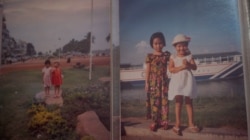PHNOM PENH — Oun Retra received a scholarship to study a master’s degree in international human rights law in 2017, another step towards her ultimate goal of becoming a judge. Later that year, she got married and went to visit her in-laws in Battambang province.
The 28-year-old said she had serious gastrointestinal pain after a meal with the family. She visited a local clinic and was prescribed over-the-counter medicines for digestive issues. The pain and bloating subsided.
Not satisfied with the diagnosis, Oun Retra visited a reproductive health clinic in Phnom Penh and was informed she had cysts in both ovaries. The family decided to send her to Thailand, where after multiple tests and scans she was diagnosed with colon cancer, and it was spreading.
“Before I was sick, I had so many dreams. I thought I would have a bright future,” said Oun Retra, in an interview with VOA reporters in November 2019.
After an extensive regime of chemotherapy in Thailand and a brief return to work and her studies, Oun Retra died in September 2020, a little over three years after she was first diagnosed.
Grim outlook
VOA Reporters spoke to Oun Retra on separate occasions in the 12 months leading up to her death. Her case highlights the challenges faced by Cambodians diagnosed with cancer; from low awareness of the disease and screening measures to inadequate treatment facilities and heavy financial costs.
A World Health Organization 2020 brief on cancer cases in the country, with data from the Global Cancer Observatory, showed that 18,375 people were diagnosed with cancer in 2020 and 12,638 died from the disease.
The country profile showed a high prevalence of cancer in the lungs and liver in men, around 40 percent, whereas women were diagnosed with breast and cervical cancers in 30 percent of the cases.
Another World Health Organization report reveals limited access to screening measures and treatments in Cambodia. In 2020, there were 2.6 mammographs, 12.4 CT scanners, 1.3 MRI scanners and zero PET or PET/CT scanners per 10,000 cancer patients.
There was no data on the number of oncologists, surgeons and radiologists per 10,000 cancer patients in the country. And the country generally lacked critical resources, such as a breast cancer screening program, bone marrow transplantation services or palliative care facilities.
VOA Khmer interviewed an array of doctors who said that while it was inarguable that the country, in general, lacked medical resources, it was the late-stage diagnosis of cancer and the lack of specialized doctors that were resulting in a high number of deaths.
Dr. Preap Ley, who has worked with breast cancer patients in Phnom Penh’s Sihanouk Hospital Center of Hope, said most of the patients are diagnosed with stage 3 and stage 4 cancers.
“Some [patients] can live as long as four to five years. But if they come at stage 3 or stage 4, they probably live around one and a half years,” he said.
Cancer staging describes the size of a tumor and if it has spread to different parts of the body. Stages 0 to 3 mean the cancer is small and hasn’t spread, but stage 3 to 4 shows that the cancer is larger and may have spread to either nearby tissues and lymph nodes or other body organs.
According to the International Agency for the Research on Cancer, more than 70 percent of cancer patients referred to oncologists in Cambodia were at an advanced stage of the disease. In comparison, a third of patients in developed countries are diagnosed at a late stage.
Dr. Ley said this could be attributed, in some cases, to people’s preference to first visit traditional medicine practitioners or spiritual healers, delaying their eventual diagnosis. Often, they would try health products and medication advertised online, he added.
Oun Retra said she had similar gastrointestinal issues in 2013, four years before her diagnosis. She had chosen to go to local clinics to have the problem diagnosed, but every doctor prescribed her medication for digestive issues, giving her only temporary relief.
She could not confirm if she already had cysts in her ovaries or a tumor in 2013.
Costly experience
Once diagnosed, cancer patients in Cambodia have to navigate the limited options they have in the country, or, like many, they choose to go to Thailand to receive treatment, often a higher cost.
A 2017 article from the International Atomic Energy Agency, showed that of the 15,000 cases that year, nearly 13,500 cases needed radiotherapy, but local facilities could only treat 500 people annually.
The same article reported that 1,500 patients, 10 percent of that year’s cases, traveled overseas to get radiotherapy, still leaving a large number of patients will little access to the critical treatment.
Ev Sokha, head of the National Cancer Centre at Calmette Hospital, said that there were only 50 qualified physicians in the country to treat cancer, far lower than what was required.
“We may need around 1,000 cancer doctors to respond to the needs of patients and families,” he added.
He said patients, both treated locally or those who travelled overseas, incurred heavy costs – a common issue faced across countries, he said.
“It consumes a lot of resources from the family,” said Eav Sokha. “Lots of people use their out-of-pocket money for treatment.”
“Even people in rich countries like the United States complain that the cost of cancer treatment is so huge, it’s beyond our ability to afford it, and the treatment takes years,” he added.
Oun Retra recounted how her family had to spend more than $40,000 on several rounds of chemotherapy in Thailand, informing VOA Khmer reporters that her treatment had stopped with the start of the COVID-19 pandemic.
Community assistance
The Phnom Penh resident was still getting treatment in Phnom Penh but the family’s financial resources were severely depleted. They had spent the money they got from selling a family-owned home to fund Oun Retra’s treatment. Her parents sold noodles at the local market.
A last-ditch attempt to seek public donations yielded surprising results.
“We couldn’t believe other people were willing to help us financially,” said Oun Soknea, Oun Retra’s sister. “My mother was crying.”
Oun Retra said she found it helpful to post about her progress in a diary at first, soon taking her experiences to Facebook.
“I have described my side effects in my Facebook posts,” she said. “It started from my first chemotherapy. I described what had been changing in my body.”
The cancer patient tried to start a Facebook support group for other patients but said it did not do well, adding that it was possible people did not want to talk about these issues publicly.
Sihanouk Hospital Center of Hope’s Preap Ley said increased public awareness was key to catching the disease in an early stage – one of many steps to ensure that patients get treatment before it is too late.
“Do not go to the 'kru Khmer,' or monks. It's going to be late,” she said, referring to traditional healers. “First, come to medical doctors.”








